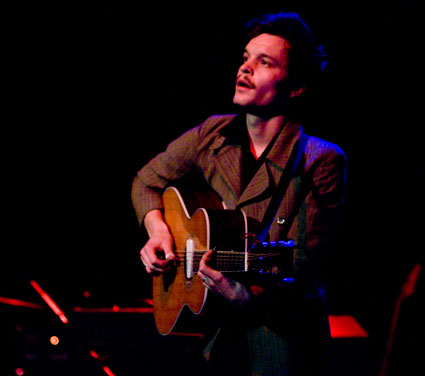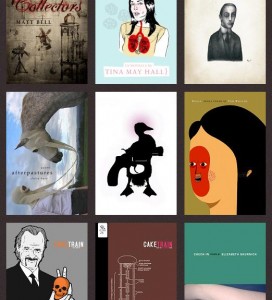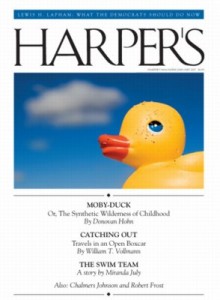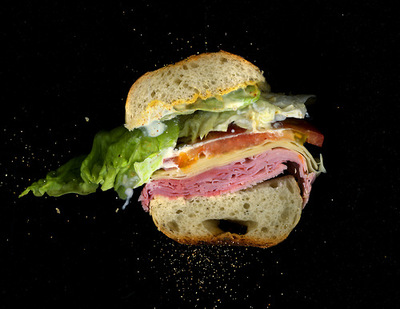I saw The Tallest Man on Earth.

Last night I saw Kristian Matsson, a.k.a. The Tallest Man on Earth, at the Troubadour here in Los Angeles. Now, the Troubadour is a small venue, maybe able to fit 200 people; I sat on the balcony, front row, with a perfect view of Kristian’s performance. He was phenomenal.
I’ve been a fan of his work since I downloaded his album Shallow Grave, which I did immediately after seeing this performance. Everything beautiful in that movement — his energy, his nuanced mastery of the guitar, his apparent charisma, i.e. his heart — all of that was present and amplified last night. He was one of the best live musicians I’ve seen. And not only was his performance powerful, fun, surprising, intelligently structured — subtle variations and waves of change in tempo and amplitude that he utilized brilliantly, making each song seem to sing out in power that much more — not only was it all that, but he was also really nice to the audience, and highly alert, and gracious.
So if you haven’t already, read up on Kristian (a native of Sweden) and listen to his music and see him live.
John Cage; a dialogue between art.

After two years it became clear to both of us that I had no feeling for harmony. For Schoenberg, harmony was not just coloristic: it was structural. It was the means one used to distinguish one part of a composition from another. Therefore he said I’d never be able to write music. “Why not?” “You’ll come to a wall and won’t be able to get through.” “Then I’ll spend my life knocking my head against that wall.”
This excerpt is from John Cage: An Autobiographical Statement, which is filled to the brim with remarkable and inspirational ideas, as is the conversation between John and Paul Cummings. Topics covered: Zen Buddism, Black Mountain College, John’s chess apprenticeship with Duchamp, mythology, Wittgenstein, Malevich, painting, the nature/structure of music, the ‘dialogue’ between arts and artists, etc.
Last book I loathed

Worst book ever?
I have really enjoyed reading through the Rumpus list of writers talking about their favorite books. Sometimes surprising, occasionally illuminating and eminently useful. And you know, it has been said by some that if you don’t have something good to say, you shouldn’t say it at all. Maybe. My Manichean outlook, however, demands that likewise a list of the last books that attentive readers absolutely despised would be an equally fruitful enterprise. I know we’re all about positivity here, but I, for one, would appreciate some timely warnings of books that will, if I’m not careful, make me bleed out of my eyes and rend my bathroom slippers in agony. The three least awesome books I’ve read recently are these:
1) The Hour I First Believed, by Wally Lamb: I’m still dealing with the aftermath of this nearly 1,000 page bucket of swill. The Oprah-adored author uses the Columbine massacre as a jumping off point for his emotionally manipulative, clichéd slop bucket of senseless tragedy.
2) The Kindly Ones, by Jonathan Littel: I guess I just have a problem with books that demand a lot of my time and page-turning energy and don’t give anything but poop in return. Littel’s controversial novel of a sadistic, intellectual S.S. officer making his way through the various theaters and meat grinders of World War 2 seems like the type of thing I’d be into. Not so! The flat and unlovely prose (maybe what you’d expect of a book written by a Nazi bureaucrat) is only to be outdone by the author’s obsession with feces.
3) Break It Down, by Lydia Davis: Blasphemy! I kind of liked The End of the Story, and, to a lesser extent, Varieties of Disturbance, but this one just didn’t do it for me. For every story I liked, there were three or four that made me want to quit reading forever.
What books do you hate?
I Like Caketrain a Lot and interviewed them about it
 When I say Caketrain never ceases to amaze me, what I mean is that Amanda Raczkowski and Joseph Reed are always amazing me. Even when I’m not doing anything but trying to fall asleep, even when I’m doing tons of stuff like negotiating printer maintenance costs for the Stamford office, I marvel: how do they do everything they do so well? The things they publish in the journal are continually new, smartly readable, and surprising. Their books are fun to hold. Their design is consistently impeccable. And they’re making it happen so affordably that anyone can buy and read them. What a great way to save literature, to not overcharge for it.
When I say Caketrain never ceases to amaze me, what I mean is that Amanda Raczkowski and Joseph Reed are always amazing me. Even when I’m not doing anything but trying to fall asleep, even when I’m doing tons of stuff like negotiating printer maintenance costs for the Stamford office, I marvel: how do they do everything they do so well? The things they publish in the journal are continually new, smartly readable, and surprising. Their books are fun to hold. Their design is consistently impeccable. And they’re making it happen so affordably that anyone can buy and read them. What a great way to save literature, to not overcharge for it.
So one day, when I couldn’t take my publisher’s envy anymore, I sent them a few questions that first rattled to mind. They responded generously, taking my trivialties and forming from them genuinely interesting subjects. And even better than that, they included pictures and captions and links that fit seemlessly into the HTML Giant archives. Read the interview below the fold. READ MORE >
Some people are retarded, and some people are sad
You’ve probably noticed there’s been more youtube clips than usual; contributors have recently been ‘granted access’ to post their own. I figure I’d do one too.
The following clip is beautiful — and as facetious my tone usually is, I swear I’m not trying to make fun of these people, or glorify their disabilities. I just found it mesmerizing to watch. They are remarkable human beings, and by ‘remarkable,’ I mean exactly that. They make me want to remark about them, which is what I’m semantically chasing my tail about. ***Please note that the person who uploaded/edited the clip is an asshole, and that the fake ad/sponsor ‘Fart Inhaler’ at the end is a sad and cruel attempt at being funny.
httpv://www.youtube.com/watch?v=hDa5G0czkTY
I like Harper’s a lot
 Harper’s is my favorite magazine, primarily because of their ‘index,’ ‘findings,’ and ‘readings’ sections. The editing is rather conceptual — in the way ‘objective’ journalistic facts are asserted rhetorically (even humorously) through their juxtaposition. It’s a weird mash of heady inquiry and stuffy sarcasm, and I often find myself laughing out loud.
Harper’s is my favorite magazine, primarily because of their ‘index,’ ‘findings,’ and ‘readings’ sections. The editing is rather conceptual — in the way ‘objective’ journalistic facts are asserted rhetorically (even humorously) through their juxtaposition. It’s a weird mash of heady inquiry and stuffy sarcasm, and I often find myself laughing out loud.
In ‘findings,’ always the last page, new discoveries are presented and written with an aesthetic glint for the absurd evocative of the best surrealism. For example:
A Viennese chemist concluded that bellybutton fluff is a combination of clothing fibers, sweat, dust, and fat wicked into the navel by body hairs […]; Placentas were appearing in the sewers of Illinois […]; In Hawaii, a woman found a $5 bill inside a coconut […]; Americans were losing their religion.
I kind of screwed that up by picking out my favorite lines — which inadvertently implicates my point that the editing is awesome. If non-fiction is the launching pad for fiction, this is where it’s at.
Let’s make a list.

Kevin commented on my Letters to Wendy’s post earlier today that he thought the book is one of the most “stunning pieces of art to appear in the last ten years.” It occurs to me that I tend to agree with that assessment. Letters to Wendy’s really did change the way I thought about poetry and fiction. It changed the focus of my reading. It changed the way I approach writing, too.
The writers and readers of this blog seem to have a taste for innovative work. If asked to name one book that permanently and significantly rewired the way you read or write, what would it be?
In a few days, I’ll update this post with a list.
UPDATE:
Actually, what the heck. Let’s open this up. A piece of music, a film, a photograph, a painting. What piece of art significantly rewired the way you think of art or create art.
I like Donald Rumsfeld a lot
 In 2003 (sorry I’m late) Hart Seely, a reporter and occasional humorist, arranged Donald Rumsfeld’s evasive paradox-ridden Pentagon briefings and media interviews into poems, collected in Pieces of Intelligence: The Existential Poetry of Donald Rumsfeld. Political satire is not new territory, but this is just awesome. Here is an example:
In 2003 (sorry I’m late) Hart Seely, a reporter and occasional humorist, arranged Donald Rumsfeld’s evasive paradox-ridden Pentagon briefings and media interviews into poems, collected in Pieces of Intelligence: The Existential Poetry of Donald Rumsfeld. Political satire is not new territory, but this is just awesome. Here is an example:
The Unknown
As we know,
There are known knowns.
There are things we know we know.
We also know
There are known unknowns.
That is to say
We know there are some things
We do not know.
But there are also unknown unknowns,
The ones we don’t know
We don’t know.Department of Defense news briefing
Feb. 12, 2002
“Parker’s Back” by Flannery O’Connor
 (New! Femme Friday: Every Friday I’ll write a review, post an interview, or discuss in some way, a female writer or editor that rocks my world. I’ll alternate between Indie scene people and more well known or established women, living and dead. Next friday, look out for a review of Jackie Corley’s book, The Suburban Swindle (from So New Media, click here so you can buy it and read it before my review). And- Spoiler Alert! “Parker’s Back” is discussed in full here.)
(New! Femme Friday: Every Friday I’ll write a review, post an interview, or discuss in some way, a female writer or editor that rocks my world. I’ll alternate between Indie scene people and more well known or established women, living and dead. Next friday, look out for a review of Jackie Corley’s book, The Suburban Swindle (from So New Media, click here so you can buy it and read it before my review). And- Spoiler Alert! “Parker’s Back” is discussed in full here.)
“And the angel of the Lord appeared to him in a flame of fire out of the midst of a bush: and he looked, and lo, the bush was burning, yet it was not consumed.” Exodus 3, 2
In the short story “Parker’s Back” by Flannery O’Connor, as in all of her work, there is an absence of overt moralizing and yet nearly every moment of the story, every action depicted, expresses the human soul’s struggle against, and toward, the power of God. O’Connor is radical in her de-emphasis on belief: many of her truly saved characters and prophets don’t properly believe in God, but it is God that takes them anyway. O’Connor’s vision of God is more or less that God is something that happens to us.

